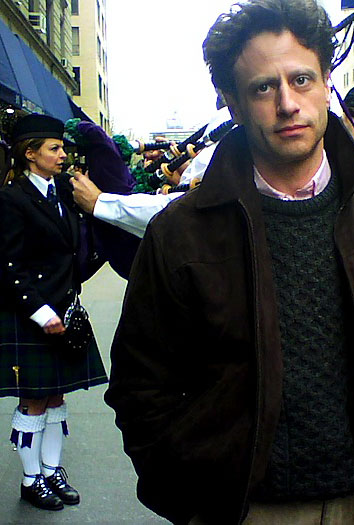
| Jacket 40 — Late 2010 | Jacket 40 Contents | Jacket Homepage | Search Jacket |
This piece is about 4 printed pages long.
It is copyright © Ben Mazer and Jacket magazine 2010. See our [»»] Copyright notice.
The Internet address of this page is http://jacketmagazine.com/40/mazer-poem.shtml
Samson that great city, his anatomy on fire
Grasping with gnarled hands at the mad wasps
Yet while his bearded rage survives contriving
An entelechy of clouds and trumpets.
— Ern Malley, “Documentary Film”
Avion, Gorrion.
what does this mean?
DC-3 divisible by three.
a bilingual entelechy.
When it was raining
a man stopped into the store,
emerging from the street
as the street must have been
to him, entering the store.
He asked for a book that didn’t exist,
but were his questions answers
that didn’t exist, but for me.
The rain grew darker, and the quiet louder,
separate from what we were here for,
veering into ideas of evenings just around the corner
like streaks of newsprint honouring the living,
promising a glitter of excited chatter
and the audible crackle of a firm reply
in a dry room where a fresh gaze amplifies
the removal of a jacket to an unlooking chair,
where a cloud shifts in the glint of an eye,
glowing and growing on embroidery flowering,
sinking into a gutter of loneliness
where everything that happens is obscured,
where darkness and silence become comforting
because familiar, locking the library
while other people rush to see a play.
Cocktails and cigarettes, warmer, more rapidly
affirm the towering city,
and yet apart from it I saw you were
in need of identifying in thin layers
in circles turning, what you were
as if some smile were rained on high above
the revelers distracted from their hearing,
looked on and looking on
in the frank moment of your naked gaze,
as if you put it in a question to me,
that I hesitating not to answer
revealed like thunder in rained on eyes.
A sudden meaning of the printed flower.
And what of
avion, Gorrion.
A bilingual entelechy.
What do the letters dispense with,
do they recall
forms or patterns of a habit
knowing for an unknown name.
I put it to you.
Do these omissions
exceed their tolerance
for identity ungroping to be blind.
Reaching like a bomb or gun
into the alert heart.
Most of history is lost.
These stories (rain-like chatter) point away from
jade and onyx halls the mind caresses
caught like a mirror in its desperation.
Fantastic corridors eight arms of Buddha
retain the silence of a sentence on.
Corridors that lead to many rooms
where nothing is known, or what is known,
enacted before, conspires discreetly
to initiate salvation
in evil, heaping plunder of trade,
glittering treasure so fabulous
it cannot be measured except in legend.
Removed rooms, if they exist.
Where yet upon the eve of some great journey
travelers share a meal in conversation
only dimly aware of being watched,
of activities their splendid host conceals,
unthreatening, unknowable,
the unknowing that pleasure itself delights in,
tasting rare delicacies of an exotic host.
Behind the surface what was never asked,
something to lose in pondering over sleep,
with the next day looking like lace over high cut glass,
in the image of a man inside a man,
impossible doubt left hanging, or erased.
And what of
avion, Gorrion.
Is there somewhere another,
architect, painter,
proficient in the classical arts,
to be forgotten, as if the age uproots
its mirror image, recalls strict languages
of the hour after dinner,
the unknowable brother.
The dents insert a slight influence
on schemes of color, on whole forms of classical music
kept in the silence of a marble sculpture,
opened only in the thin hours
before others wake.
Agreed upon
as if an entertainment
could ally the feelings
of what each keeps
in a back drawer, with scissors and paste and tape.
This is not that other
finding himself
seized in the midst
of a dying city
where all voices blur
bright in blindness,
the brushstroked paint
of an absolute color
in a small town’s wake.
A clown seized in madness,
admitting and exonerating nothing.
Avion. Gorrion.
Say it again, but do not understand
the imprint of its meaning.
Cease to leave its foul importance
settling in a corner, in obscurity.
There is no need to understand or visit
what has been left behind, what cannot name itself
for fear of belying its greater importance,
stumbled on, perhaps, in the rain.

Ben Mazer
photo by Vanessa Barnard
Ben Mazer’s most recent collections of poems are Poems (The Pen and Anvil Press, 2010) and January 2008 (Dark Sky Books, 2010), both of which are reviewed in this issue of Jacket. He is the editor of Selected Poems of Frederick Goddard Tuckerman (Harvard University Press, 2010) and Landis Everson’s Everything Preserved: Poems 1955-2005 (Graywolf Press, 2006). He lives in Boston, where he recently completed a PhD under Sir Christopher Ricks at the Editorial Institute.